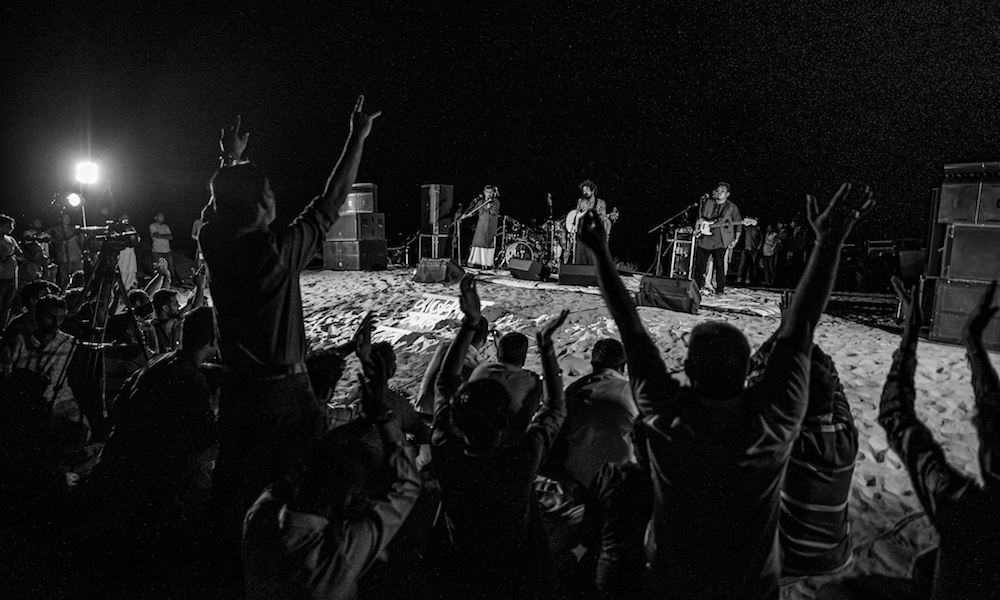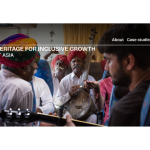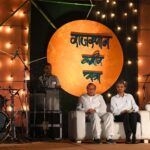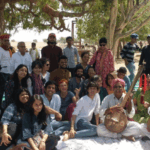
Pierre Flasse and Gopal Singh discuss how music is keeping the cultural dialogue alive in Rajasthan

I am on the Rajasthan Kabir Yatra, a weeklong travelling folk festival across Rajasthan. A yatra (pilgrimage) in the name of Kabir, a sufi poet from the 15th century, it prides itself on love, social discourse and peace. Every morning begins with all the yatris and musicians engaging in a satsang – a circle where the all the music and poetry sung together, encourages discussion and connection with one another. Then we travel to the next village and sing, listen and dance until the early hours of the morning. We are only at the beginning of the week but the emotional and physical intensity of the yatris, musicians and atmosphere is undeniable. I sit down with Gopal Singh, the director of the festival as volunteers are in motion around a beautiful old fort and school to create the stage for the third evening.

To start things he describes the story behind the yatra and the meaning it has: “In Rajasthan we have different musical and cultural traditions in folk and mystic music, which take place in informal spaces that we have in the community – the satsang – a circle of ‘the seekers of truth’. They sing together and share their music from the mystic poets like Kabir and Meera, and the whole idea of this musical space in society is to celebrate the diverse musical history we have in mystic traditions. You might follow the Kabir sect, the Sufi sect, or other traditions, but in the sharing space of satsang everyone is welcome to share the space, music and the poetry.” Importantly, he describes why the festival has been important to local communities: “There is no discrimination, there is no hierarchy, that one follower is better or superior. This is very crucial to create the bond within the community itself; because in India we have different caste systems, hierarchy in religions – we are all aware of it. So this space actually breaks these boundaries.”

Across much of India, music works in a form of patronisation. Music is played privately by caste musicians in higher caste homes as a form of entertainment, memory and documentation of history. But Gopal sees this festival as outside of that tradition. Although much of the music, instrumentation and sound is similar, the content drives a different purpose: “This isn’t traditional folk music, we are actually not patronising the musicians in this form. We are building the space for the dialogue of the power of mystic music, because when we talk about Kabir and Meera, their philosophy talks through different lenses. Music is just one part, but poetry is important here. So through this Kabir Yatra I want to create a space not only for the music, but for poetry and spirituality. In the folk music generally we talk about the songs and the music is more dominant. But in the mystic music the poetry is very important.” He goes on to describe the real depth and societal importance from the poetry: “the message is crucial; it has to be conveyed. Not the music. This is not entertaining music, this is not an entertaining performance as in folk music. In this space, the sharing is important. Traditionally people used to sing one song in the night and have one hour of discussion on it. This discussion is important; they speak about the poetry, its depth and the discourse. Sometimes they don’t agree on the interpretation and they challenge it.”

Despite this journey to spread Kabir’s message and engage with the community, Gopal is completely reluctant to glorify their work. He rejects the idea that they are providing something, even though this does provide something for the community and yatris themselves on a platform that doesn’t normally exist. He says: “The implications I don’t know. I haven’t done an official case study, so whether it is really going to help or not, or if people are enjoying, how people are taking it up, or how the community is responding. I don’t know what sort of impact it is creating, so I won’t say that. I can’t claim that I am creating a platform.”

The issue is that if he starts speaking about the event in terms of a platform, it would detriment the internal and communal value of the yatra. He explains that the intention was to, “reclaim the space of satsang that exists. Satsang is the space of truth seekers, a gathering of true people. This sharing space was the whole idea of creating the Rajasthan Kabir Yatra, so that’s what I mean when I say it’s not a festival – it’s a pilgrimage, a journey. It’s not one venue. Why are we going to villages? We are going to see the music there. Their performances, their poetry, their musicians, the landscape is very important. So through this travel, actually we are finding those spaces that already existed but were not available.”
The space exists from a lack of a one previously in Rajasthan. It’s worth saying that folk pilgrimages like this exist in other states in India, but pioneering one in Rajasthan was difficult as there wasn’t enough support, until the police saw the value of the event: “The police found it really relevant to take this music to the places that are communally sensitive or tense. Of course, when you talk about Kabir, you talk about love, you talk about humanity, you talk about how we can live together in love. You don’t need to see things in the lenses of identity, caste, community and creed. We are just human. So informally yes, I mean of course I talk to people, the police and public and I can sense when they talk and praise and they feel the energy of this music that there is a positive impact.”

Personally, I can say that the events are both emotionally and physically the best I’ve felt in an incredibly long time. From the music, feelings and dancing together and how it is all built up. Gopal said this was due to the nature of the journey of the festival. When we do this together, we live the emotions all around us: “When you do the Yatra, sometimes you’re hungry, tired, sleep deprived. So your body starts talking to you. All things will happen, then your body and mind will align and join the journey. So the music you are hearing, the sound, the energy, the transition you are hearing is actually going through, what: your body. But if you come to just consume the music then it won’t go in your body, it will just go. You are not alone, when the performance is going to start, when we eat and travel – other people’s energies are also involved there. Everyone is impacted together.” This is where the real transformative power of this event and in the community lies. All the previous attendees know what it is like, with the energy, dance and spirituality. They tell everyone about it, and so then everyone has an expectation of the energy should be like – everyone’s emotional and spiritual expectations culminate together because if they expect it together then it will happen.

When we speak about the future, Gopal is again reluctant to assume the event will continue: “I don’t see a future. It’s not about going well or bad. In 2012 I started the first Yatra and then I had to stop it. For 3 years I tried and it didn’t work. But then in 2016, something happened and the police collaboration began. So I don’t think things are really in our hand. If it has to happen then it will happen. We need to stick to the philosophy of the Yatra that we are trying to imply. Otherwise it will create a whole contrast that we have to do something to create it, let’s grab some money it has to happen – no. It doesn’t need to happen. If it’s not required it will not happen. If it is required then it will happen, I don’t know how. So you don’t need to worry about it. That’s the only way.”

The impression from Gopal is one of purity in intention and execution. The music itself takes on a different role on the journey. I’ve never been in such a position where I felt acceptance, openness, music and poetry speaking between such a vast group of people. I sat down to talk about music and we delved into a dialogue about the impact of the message of Kabir himself. At the heart lies the philosophy of the festival and it carries everybody across the week. The energetic spirituality that permeates every individual from the musicians and yatris to the volunteers and organisers is phenomenal and it’s safe to say that I’ll be a regular attendee for the following years to come.





